Bloom's Taxonomy and Learning Theories in Health & Social Care
VerifiedAdded on 2023/03/31
|10
|788
|230
Presentation
AI Summary
This presentation explores the application of Bloom's Taxonomy and various learning theories in the context of health and social care. It delves into the three domains of Bloom's Taxonomy: cognitive, affective, and psychomotor, explaining how each contributes to learning and skill development in healthcare settings. The presentation also analyzes different learning theories and their benefits in enhancing the skills and knowledge of health and social care professionals. It emphasizes the importance of adopting new knowledge, reinforcing existing skills, and tailoring training to address specific needs, ultimately improving the quality of service provided to customers. The document concludes by highlighting the necessity of continuous learning and equal participation from learners to maximize the effectiveness of training programs. Desklib provides a platform to access more solved assignments and learning resources for students.
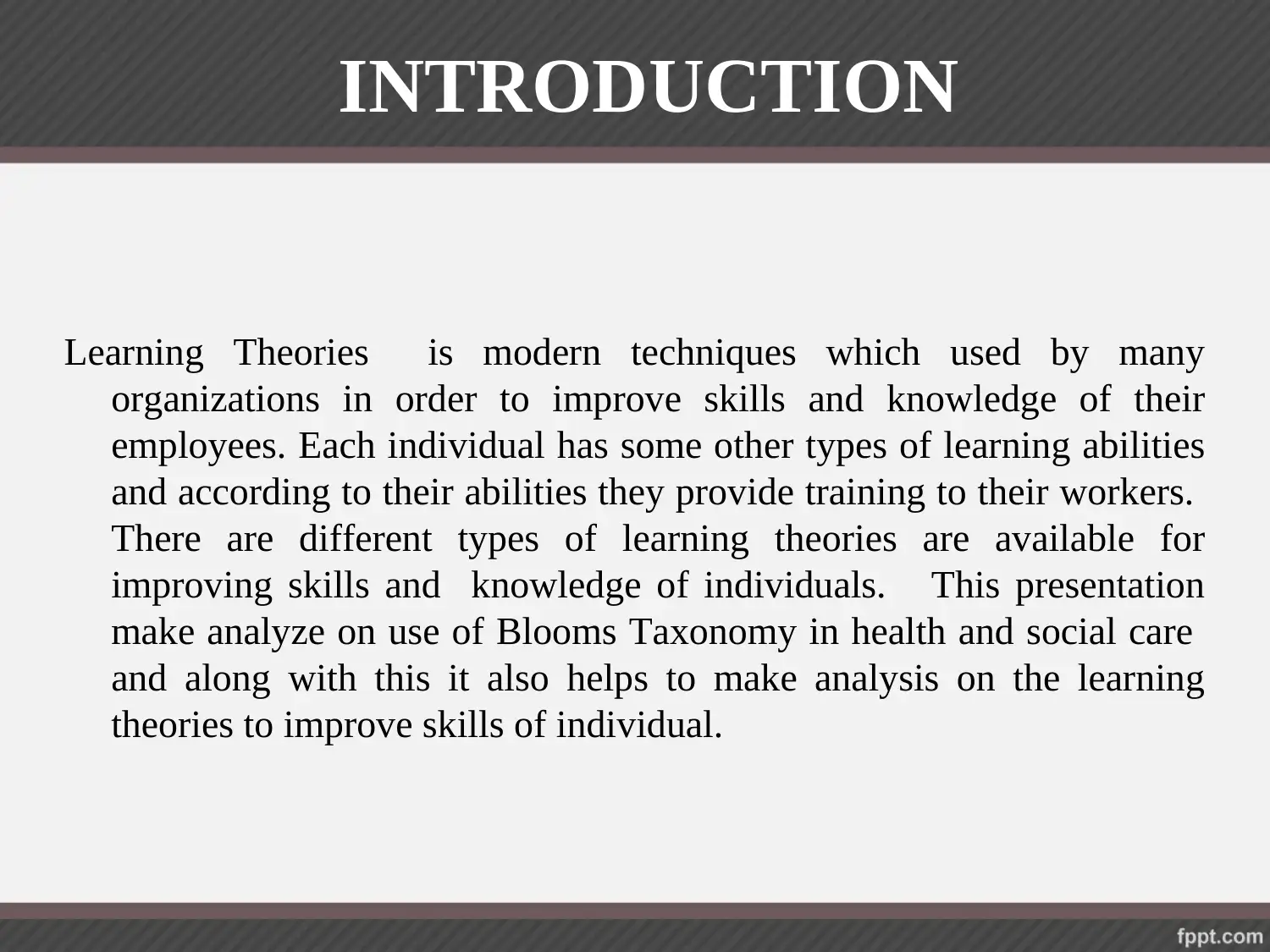
INTRODUCTION
Learning Theories is modern techniques which used by many
organizations in order to improve skills and knowledge of their
employees. Each individual has some other types of learning abilities
and according to their abilities they provide training to their workers.
There are different types of learning theories are available for
improving skills and knowledge of individuals. This presentation
make analyze on use of Blooms Taxonomy in health and social care
and along with this it also helps to make analysis on the learning
theories to improve skills of individual.
Learning Theories is modern techniques which used by many
organizations in order to improve skills and knowledge of their
employees. Each individual has some other types of learning abilities
and according to their abilities they provide training to their workers.
There are different types of learning theories are available for
improving skills and knowledge of individuals. This presentation
make analyze on use of Blooms Taxonomy in health and social care
and along with this it also helps to make analysis on the learning
theories to improve skills of individual.
Paraphrase This Document
Need a fresh take? Get an instant paraphrase of this document with our AI Paraphraser
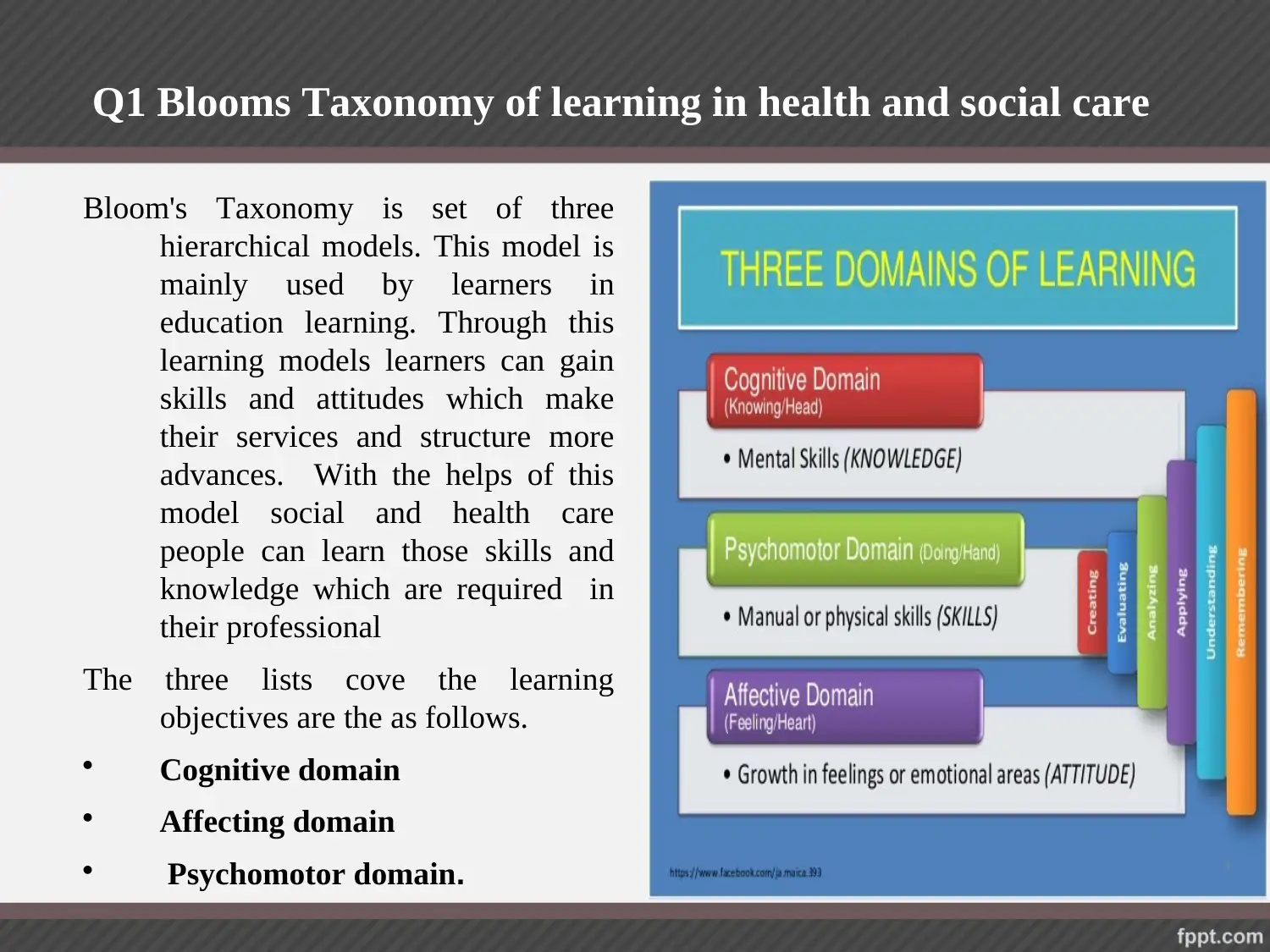
Q1 Blooms Taxonomy of learning in health and social care
Bloom's Taxonomy is set of three
hierarchical models. This model is
mainly used by learners in
education learning. Through this
learning models learners can gain
skills and attitudes which make
their services and structure more
advances. With the helps of this
model social and health care
people can learn those skills and
knowledge which are required in
their professional
The three lists cove the learning
objectives are the as follows.
Cognitive domain
Affecting domain
Psychomotor domain.
Bloom's Taxonomy is set of three
hierarchical models. This model is
mainly used by learners in
education learning. Through this
learning models learners can gain
skills and attitudes which make
their services and structure more
advances. With the helps of this
model social and health care
people can learn those skills and
knowledge which are required in
their professional
The three lists cove the learning
objectives are the as follows.
Cognitive domain
Affecting domain
Psychomotor domain.
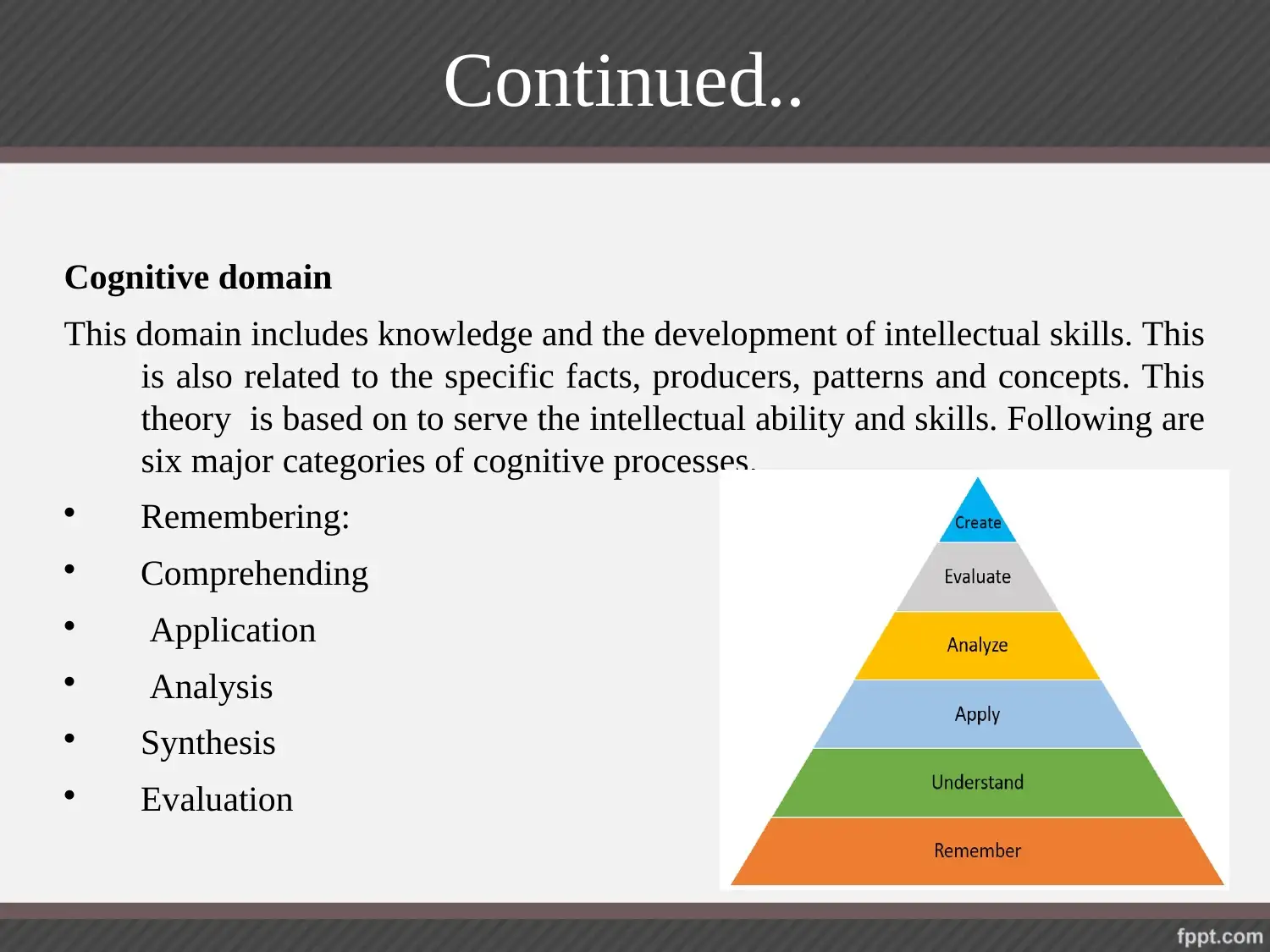
Continued..
Cognitive domain
This domain includes knowledge and the development of intellectual skills. This
is also related to the specific facts, producers, patterns and concepts. This
theory is based on to serve the intellectual ability and skills. Following are
six major categories of cognitive processes.
Remembering:
Comprehending
Application
Analysis
Synthesis
Evaluation
Cognitive domain
This domain includes knowledge and the development of intellectual skills. This
is also related to the specific facts, producers, patterns and concepts. This
theory is based on to serve the intellectual ability and skills. Following are
six major categories of cognitive processes.
Remembering:
Comprehending
Application
Analysis
Synthesis
Evaluation
⊘ This is a preview!⊘
Do you want full access?
Subscribe today to unlock all pages.

Trusted by 1+ million students worldwide
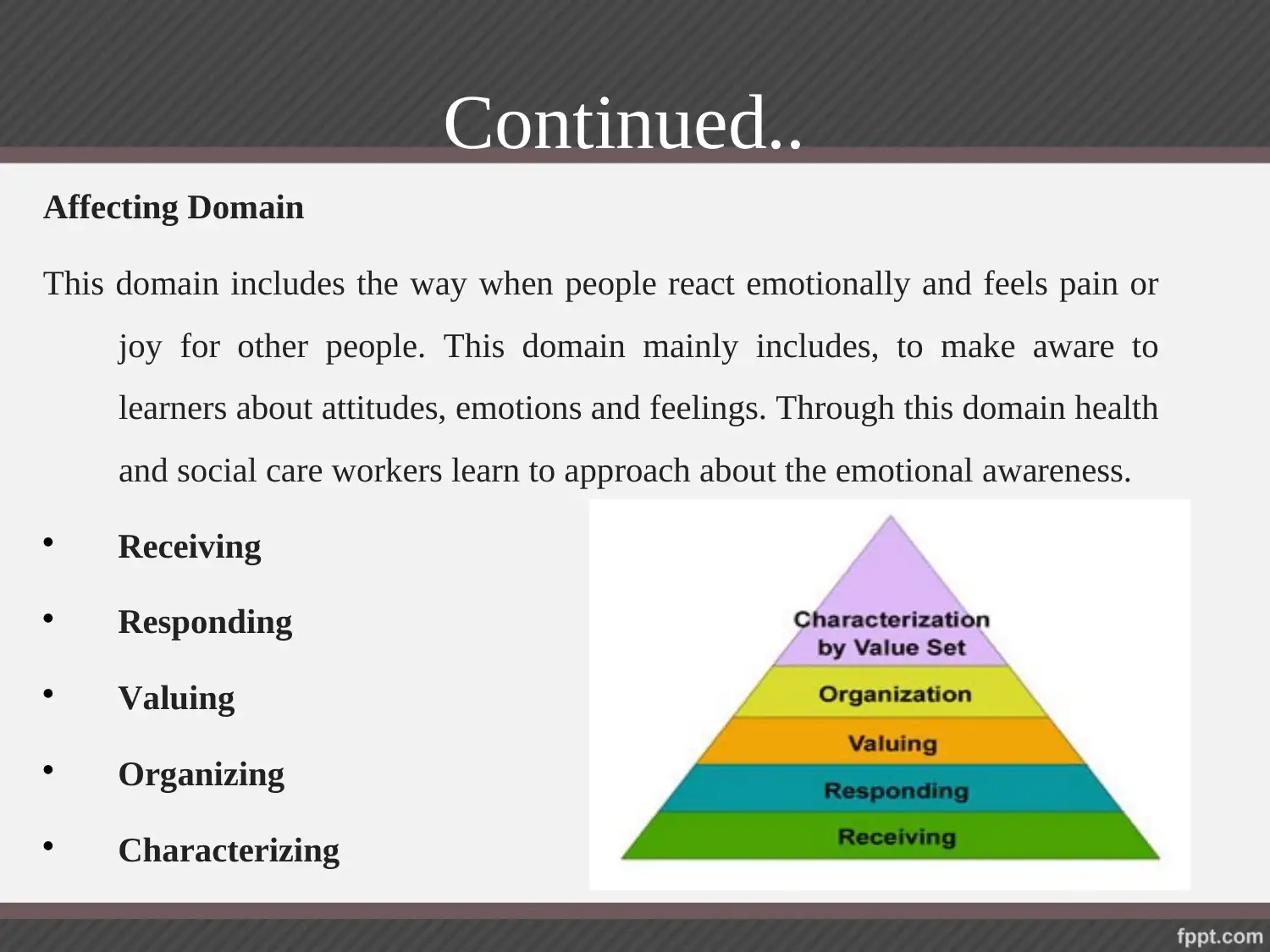
Continued..
Affecting Domain
This domain includes the way when people react emotionally and feels pain or
joy for other people. This domain mainly includes, to make aware to
learners about attitudes, emotions and feelings. Through this domain health
and social care workers learn to approach about the emotional awareness.
Receiving
Responding
Valuing
Organizing
Characterizing
Affecting Domain
This domain includes the way when people react emotionally and feels pain or
joy for other people. This domain mainly includes, to make aware to
learners about attitudes, emotions and feelings. Through this domain health
and social care workers learn to approach about the emotional awareness.
Receiving
Responding
Valuing
Organizing
Characterizing
Paraphrase This Document
Need a fresh take? Get an instant paraphrase of this document with our AI Paraphraser
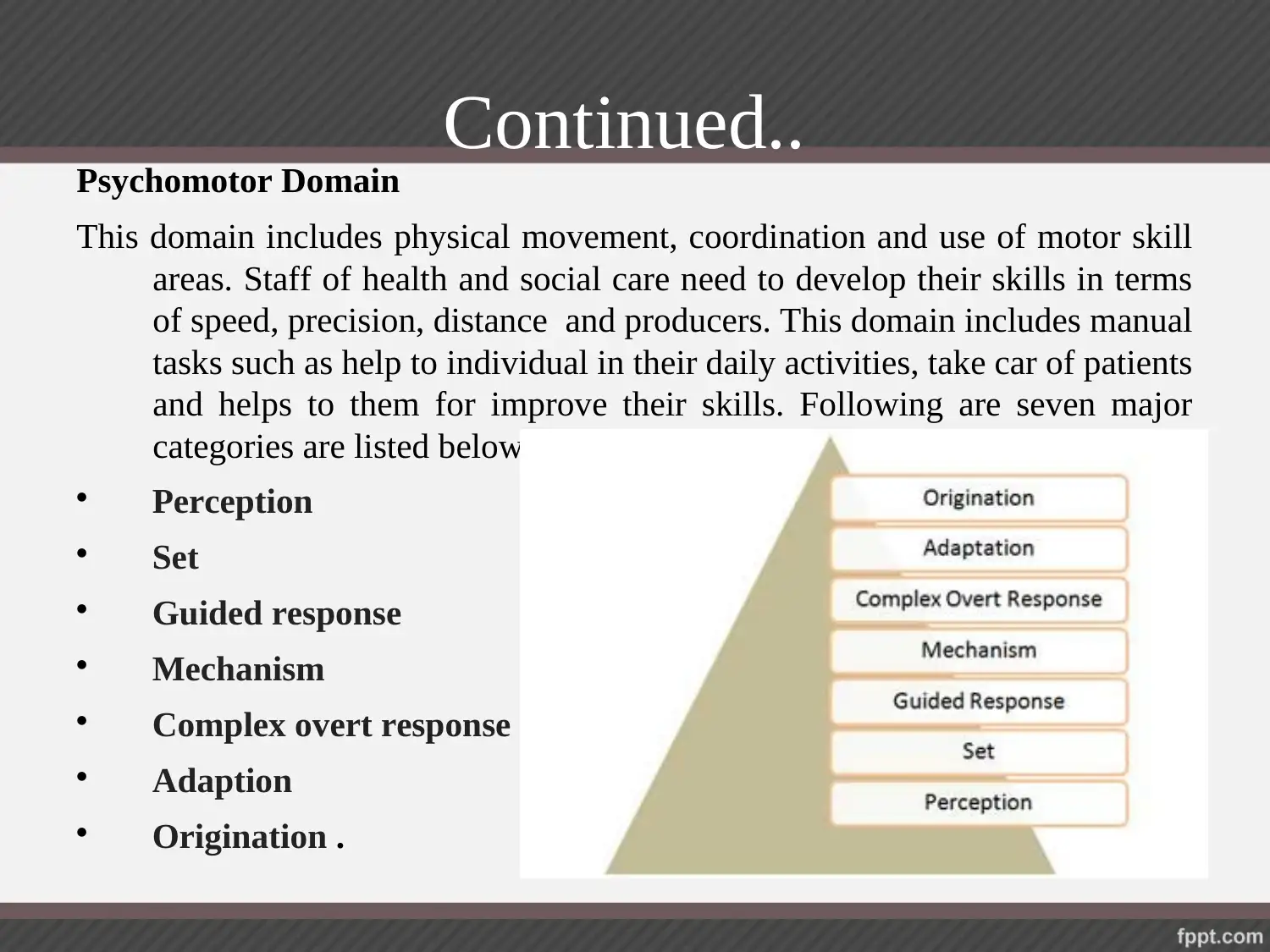
Continued..
Psychomotor Domain
This domain includes physical movement, coordination and use of motor skill
areas. Staff of health and social care need to develop their skills in terms
of speed, precision, distance and producers. This domain includes manual
tasks such as help to individual in their daily activities, take car of patients
and helps to them for improve their skills. Following are seven major
categories are listed below
Perception
Set
Guided response
Mechanism
Complex overt response
Adaption
Origination .
Psychomotor Domain
This domain includes physical movement, coordination and use of motor skill
areas. Staff of health and social care need to develop their skills in terms
of speed, precision, distance and producers. This domain includes manual
tasks such as help to individual in their daily activities, take car of patients
and helps to them for improve their skills. Following are seven major
categories are listed below
Perception
Set
Guided response
Mechanism
Complex overt response
Adaption
Origination .
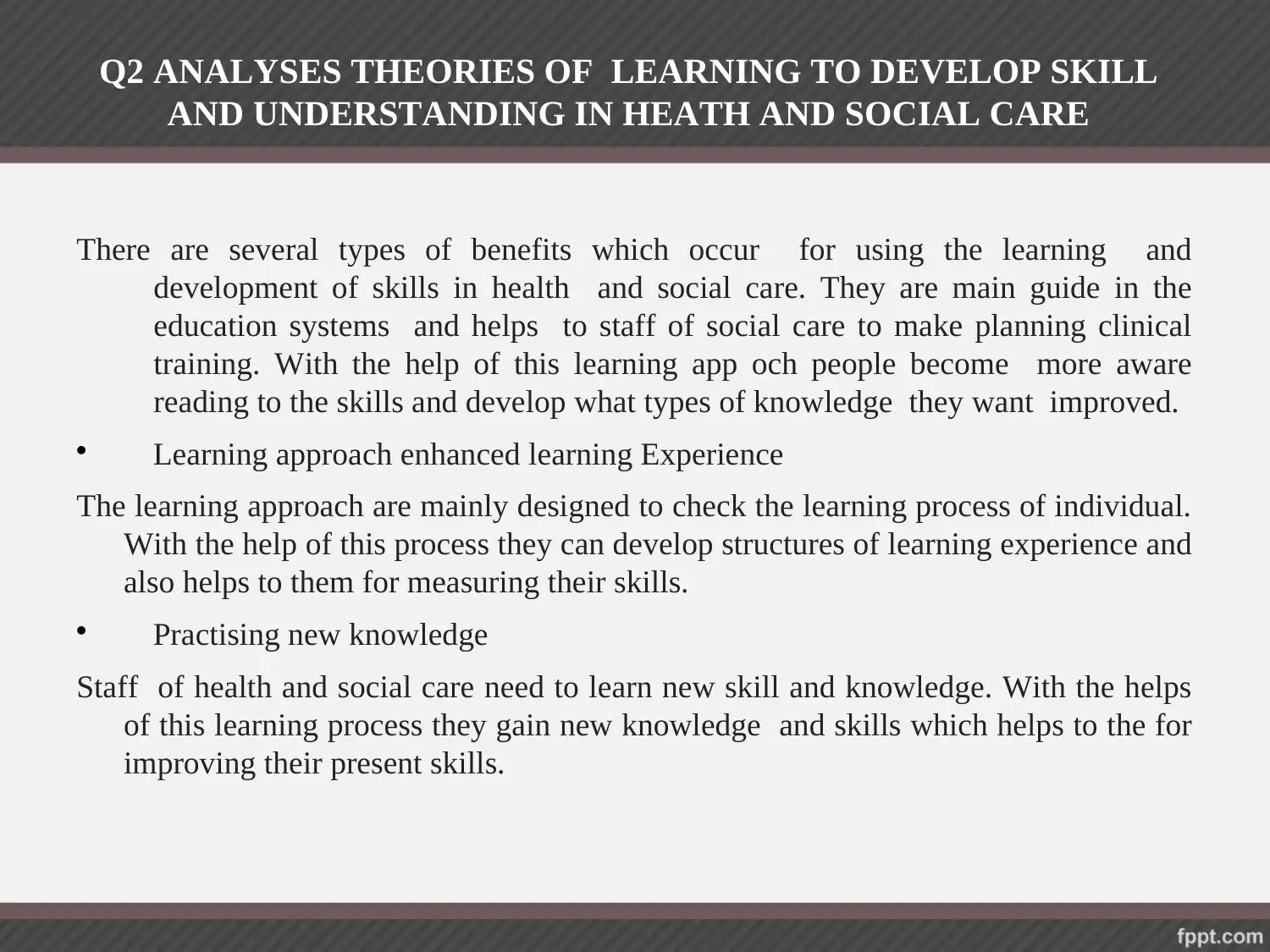
Q2 ANALYSES THEORIES OF LEARNING TO DEVELOP SKILL
AND UNDERSTANDING IN HEATH AND SOCIAL CARE
There are several types of benefits which occur for using the learning and
development of skills in health and social care. They are main guide in the
education systems and helps to staff of social care to make planning clinical
training. With the help of this learning app och people become more aware
reading to the skills and develop what types of knowledge they want improved.
Learning approach enhanced learning Experience
The learning approach are mainly designed to check the learning process of individual.
With the help of this process they can develop structures of learning experience and
also helps to them for measuring their skills.
Practising new knowledge
Staff of health and social care need to learn new skill and knowledge. With the helps
of this learning process they gain new knowledge and skills which helps to the for
improving their present skills.
AND UNDERSTANDING IN HEATH AND SOCIAL CARE
There are several types of benefits which occur for using the learning and
development of skills in health and social care. They are main guide in the
education systems and helps to staff of social care to make planning clinical
training. With the help of this learning app och people become more aware
reading to the skills and develop what types of knowledge they want improved.
Learning approach enhanced learning Experience
The learning approach are mainly designed to check the learning process of individual.
With the help of this process they can develop structures of learning experience and
also helps to them for measuring their skills.
Practising new knowledge
Staff of health and social care need to learn new skill and knowledge. With the helps
of this learning process they gain new knowledge and skills which helps to the for
improving their present skills.
⊘ This is a preview!⊘
Do you want full access?
Subscribe today to unlock all pages.

Trusted by 1+ million students worldwide
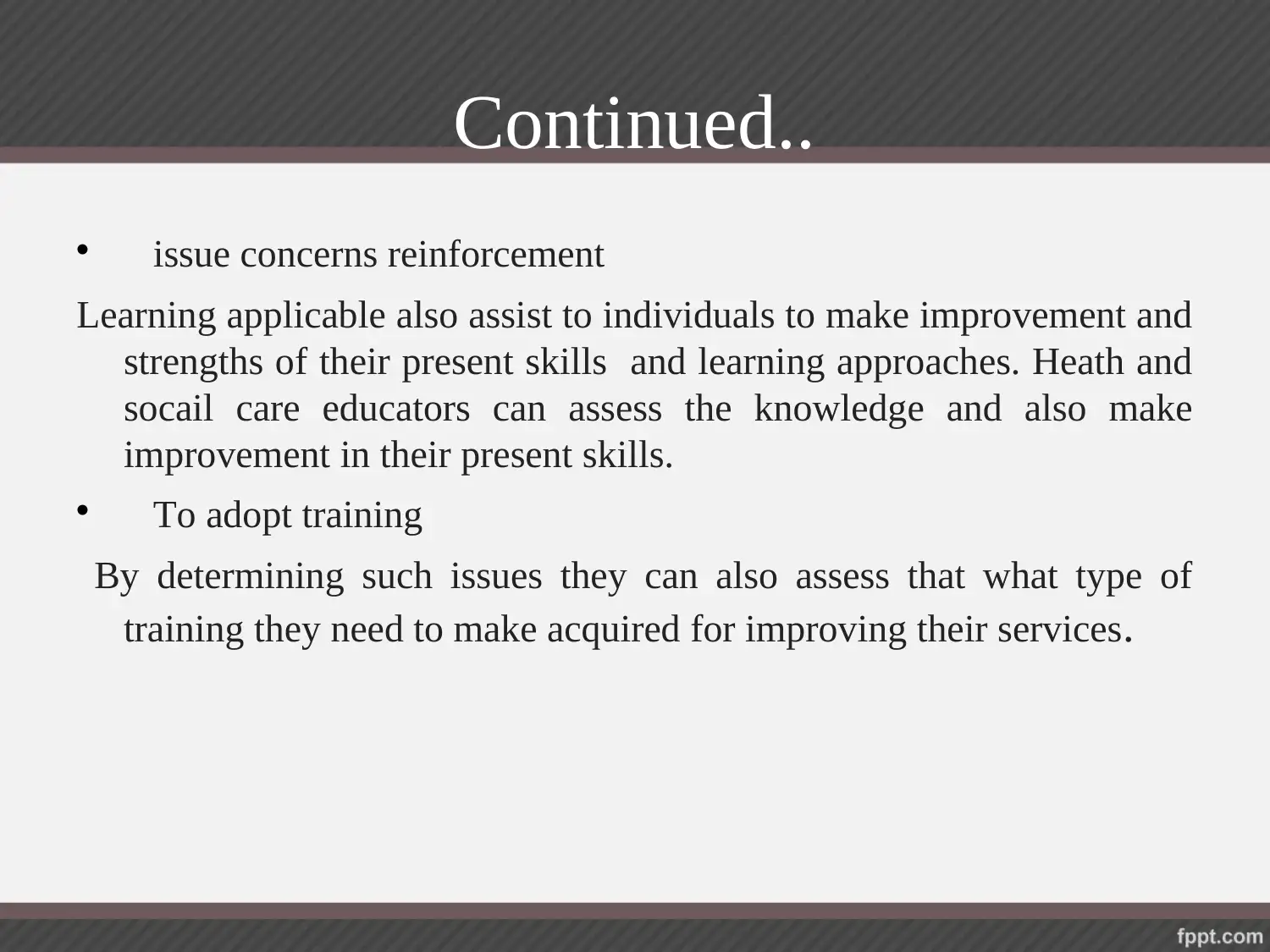
Continued..
issue concerns reinforcement
Learning applicable also assist to individuals to make improvement and
strengths of their present skills and learning approaches. Heath and
socail care educators can assess the knowledge and also make
improvement in their present skills.
To adopt training
By determining such issues they can also assess that what type of
training they need to make acquired for improving their services.
issue concerns reinforcement
Learning applicable also assist to individuals to make improvement and
strengths of their present skills and learning approaches. Heath and
socail care educators can assess the knowledge and also make
improvement in their present skills.
To adopt training
By determining such issues they can also assess that what type of
training they need to make acquired for improving their services.
Paraphrase This Document
Need a fresh take? Get an instant paraphrase of this document with our AI Paraphraser
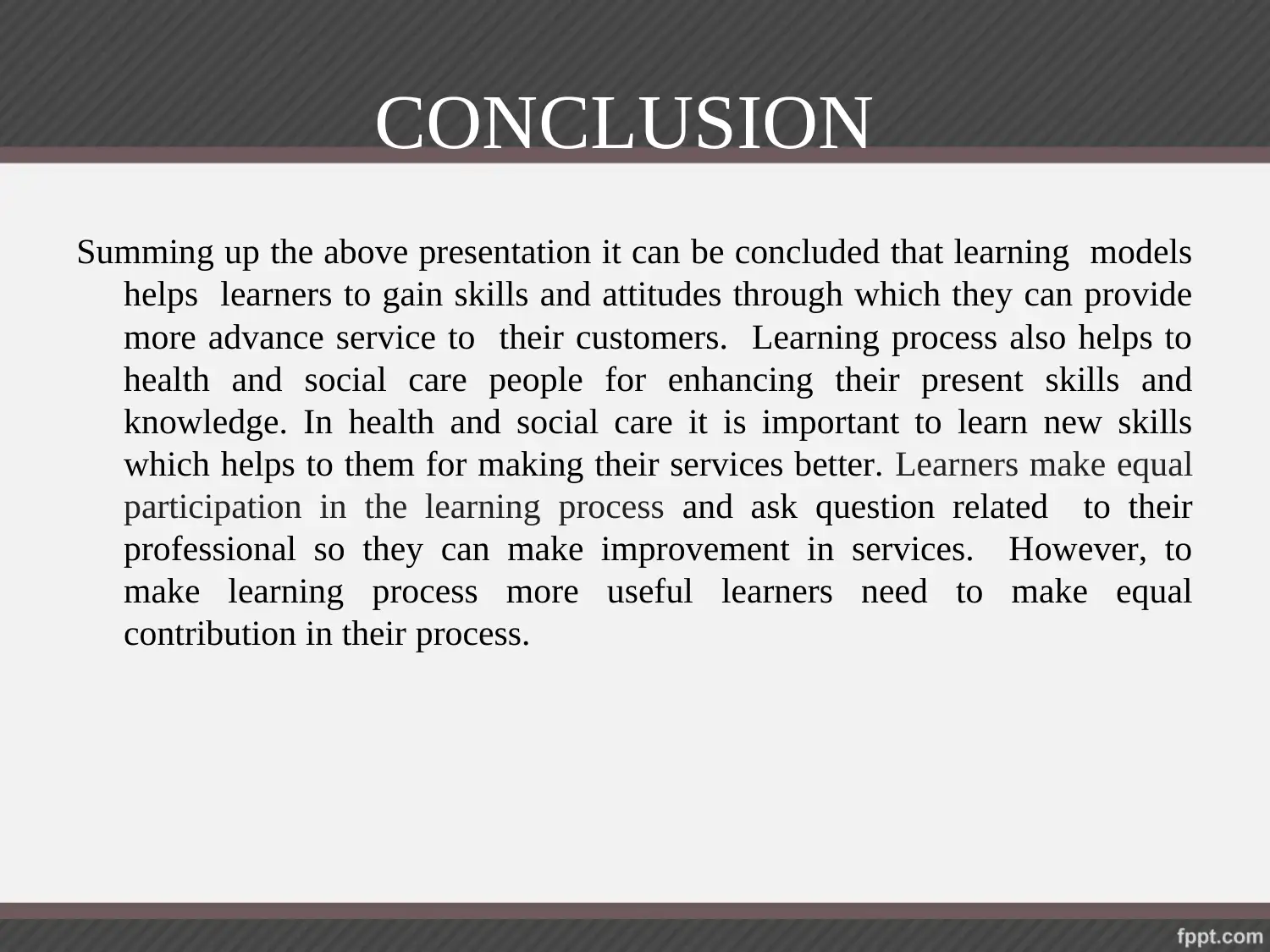
CONCLUSION
Summing up the above presentation it can be concluded that learning models
helps learners to gain skills and attitudes through which they can provide
more advance service to their customers. Learning process also helps to
health and social care people for enhancing their present skills and
knowledge. In health and social care it is important to learn new skills
which helps to them for making their services better. Learners make equal
participation in the learning process and ask question related to their
professional so they can make improvement in services. However, to
make learning process more useful learners need to make equal
contribution in their process.
Summing up the above presentation it can be concluded that learning models
helps learners to gain skills and attitudes through which they can provide
more advance service to their customers. Learning process also helps to
health and social care people for enhancing their present skills and
knowledge. In health and social care it is important to learn new skills
which helps to them for making their services better. Learners make equal
participation in the learning process and ask question related to their
professional so they can make improvement in services. However, to
make learning process more useful learners need to make equal
contribution in their process.
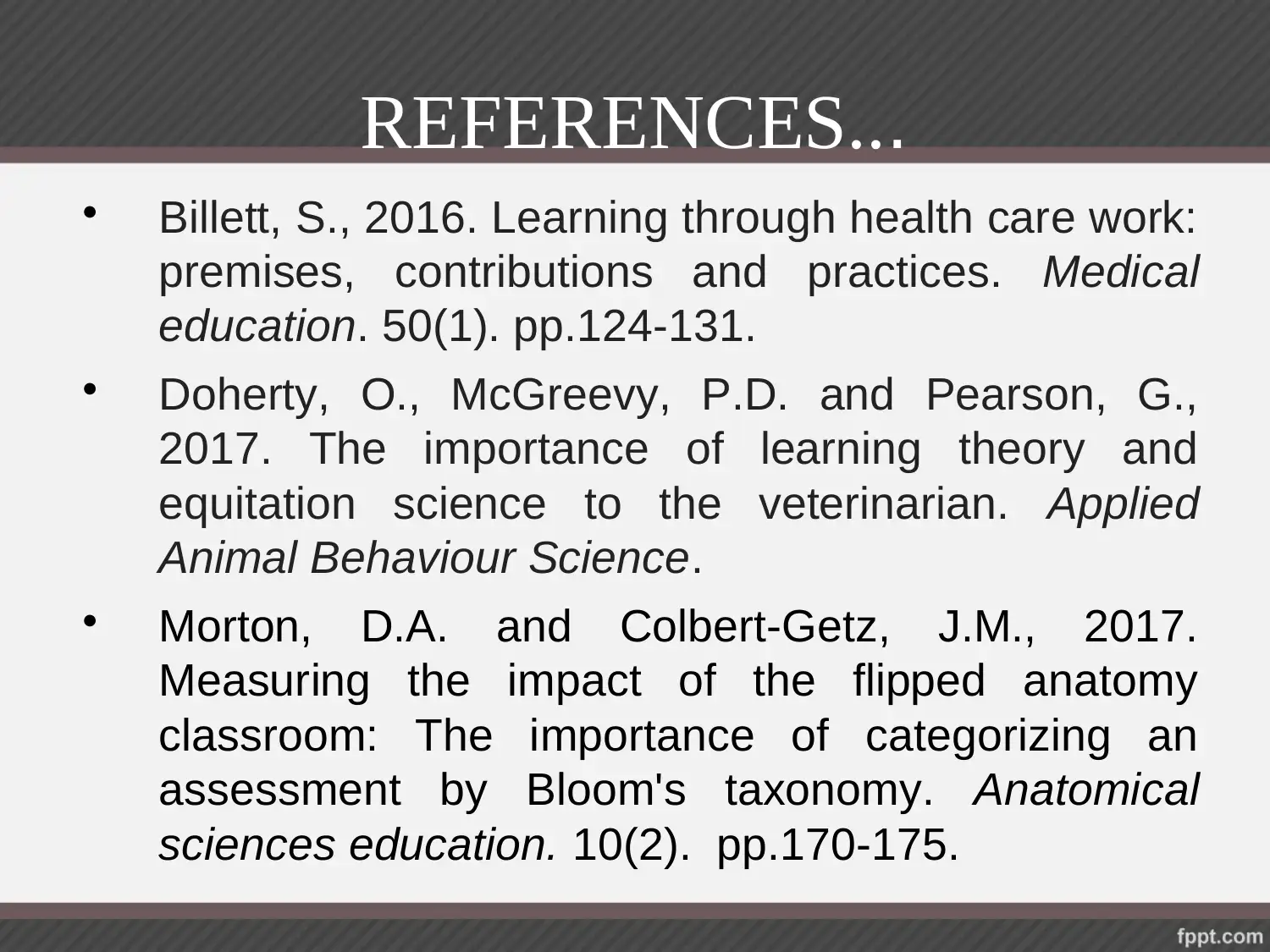
REFERENCES...
Billett, S., 2016. Learning through health care work:
premises, contributions and practices. Medical
education. 50(1). pp.124-131.
Doherty, O., McGreevy, P.D. and Pearson, G.,
2017. The importance of learning theory and
equitation science to the veterinarian. Applied
Animal Behaviour Science.
Morton, D.A. and Colbert‐Getz, J.M., 2017.
Measuring the impact of the flipped anatomy
classroom: The importance of categorizing an
assessment by Bloom's taxonomy. Anatomical
sciences education. 10(2). pp.170-175.
Billett, S., 2016. Learning through health care work:
premises, contributions and practices. Medical
education. 50(1). pp.124-131.
Doherty, O., McGreevy, P.D. and Pearson, G.,
2017. The importance of learning theory and
equitation science to the veterinarian. Applied
Animal Behaviour Science.
Morton, D.A. and Colbert‐Getz, J.M., 2017.
Measuring the impact of the flipped anatomy
classroom: The importance of categorizing an
assessment by Bloom's taxonomy. Anatomical
sciences education. 10(2). pp.170-175.
⊘ This is a preview!⊘
Do you want full access?
Subscribe today to unlock all pages.

Trusted by 1+ million students worldwide
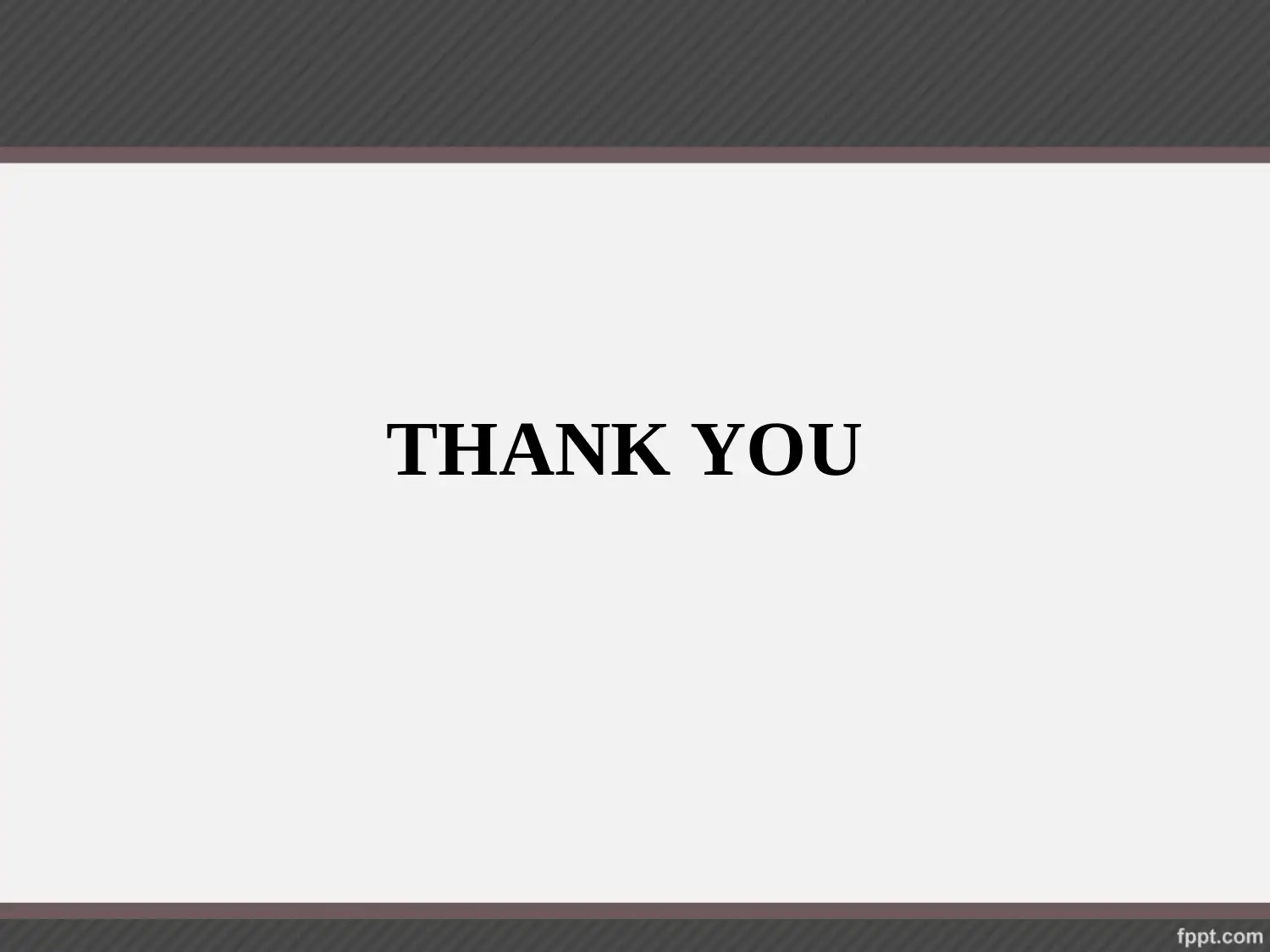
THANK YOU
1 out of 10
Related Documents
Your All-in-One AI-Powered Toolkit for Academic Success.
+13062052269
info@desklib.com
Available 24*7 on WhatsApp / Email
![[object Object]](/_next/static/media/star-bottom.7253800d.svg)
Unlock your academic potential
Copyright © 2020–2026 A2Z Services. All Rights Reserved. Developed and managed by ZUCOL.





